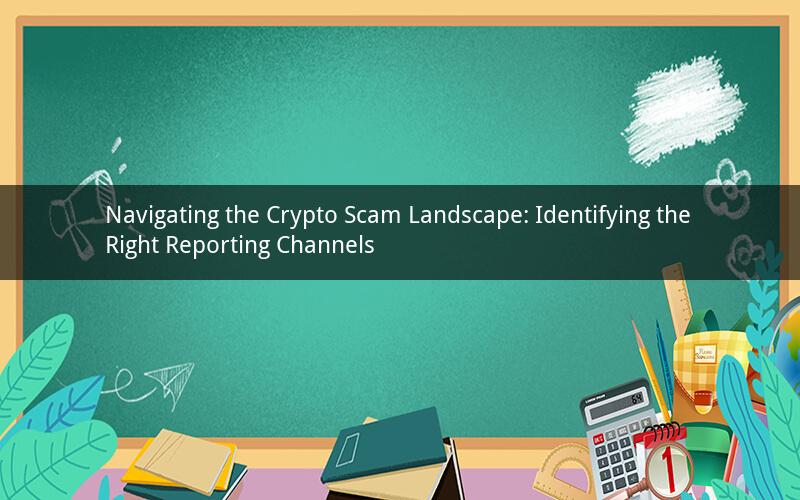
In the rapidly evolving world of cryptocurrencies, scams have become a persistent threat to investors and users. As the value of digital currencies continues to soar, fraudulent activities are also on the rise. If you find yourself a victim of a crypto scam, knowing who to report it to is crucial. This article delves into the various reporting channels available and offers insights into the process of reporting crypto scams effectively.
1. Who to Report Crypto Scams To
When it comes to reporting crypto scams, it's essential to identify the appropriate authorities. Here are some of the key entities you can report to:
a. Local Law Enforcement Agencies: If you have been defrauded, contact your local police department. They can investigate the case and provide guidance on the next steps. In some cases, they may collaborate with other law enforcement agencies to address cross-border scams.
b. Financial Institutions: If your bank or financial institution was involved in the scam, report the incident to them. They can freeze the fraudulent transactions and initiate a thorough investigation.
c. Crypto Exchanges and Wallet Providers: If the scam occurred on a crypto exchange or wallet, report it to the respective platform. They can take immediate action to freeze the assets and investigate the matter.
d. Anti-Money Laundering (AML) Units: If the scam involves money laundering, report it to the AML units of your country's financial intelligence unit. They specialize in detecting and preventing financial crimes.
e. International Agencies: In cases of cross-border scams, you can report the incident to international agencies such as the Financial Action Task Force (FATF) or Europol.
2. How to Report Crypto Scams
Reporting a crypto scam involves several steps. Here's a general outline of the process:
a. Gather Evidence: Collect all relevant evidence, including transaction details, communication logs, and any other documentation that can help identify the scammer and the nature of the fraud.
b. Contact the Appropriate Authorities: As mentioned earlier, identify the relevant authorities based on the nature of the scam and report the incident accordingly.
c. Provide Detailed Information: When reporting the scam, provide detailed information about the incident, including the amount lost, the method used by the scammer, and any other relevant details.
d. Follow Up: After reporting the scam, follow up with the authorities to ensure that the investigation is progressing. Keep a record of all communications and updates.
3. Reporting Scams on Crypto Exchanges and Wallets
If you've been scammed on a crypto exchange or wallet, here's how you can report the incident:
a. Visit the Platform's Support Page: Look for a support or contact page on the platform's website.
b. Use the Reporting Feature: Many exchanges and wallets offer a dedicated reporting feature for scams. Fill out the necessary information and submit the report.
c. Contact Customer Support: If the platform doesn't have a reporting feature, contact customer support directly. Provide them with all the relevant details and evidence.
4. Reporting Scams to International Agencies
In cases of cross-border scams, you can report the incident to international agencies such as the FATF or Europol. Here's how you can do it:
a. FATF: Visit the FATF's official website and look for the "Report a Scam" section. Follow the instructions provided to report the incident.
b. Europol: Contact Europol's Cybercrime Centre through their official website or phone number. Provide them with all the necessary information and evidence.
5. Preventing Future Scams
While reporting crypto scams is essential, it's equally important to prevent them from happening in the first place. Here are some tips to help you stay safe:
a. Research Before Investing: Before investing in any cryptocurrency, do thorough research to ensure that it's a legitimate project.
b. Be Wary of Phishing Attempts: Be cautious of emails, messages, and calls that ask for your private keys or personal information.
c. Use Secure Wallets: Store your cryptocurrencies in secure wallets, such as hardware wallets, to prevent unauthorized access.
d. Stay Informed: Keep up to date with the latest crypto news and scams to stay ahead of potential threats.
In conclusion, knowing who to report crypto scams to is crucial for both victims and authorities. By following the steps outlined in this article, you can help ensure that scammers are held accountable and protect yourself from future frauds. Remember to gather evidence, contact the appropriate authorities, and stay vigilant to prevent scams from happening in the first place.
Questions and Answers:
1. Q: What should I do if I receive a phishing email asking for my private keys?
A: Do not respond to the email or provide any personal information. Delete the email and report it to your local authorities or the relevant crypto exchange.
2. Q: Can I report a crypto scam anonymously?
A: The process of reporting a crypto scam varies depending on the authority you're contacting. While some agencies offer anonymous reporting, it's advisable to provide your contact information for follow-up purposes.
3. Q: How long does it take for authorities to investigate a crypto scam?
A: The duration of the investigation can vary depending on the complexity of the case and the resources available. It's important to be patient and follow up with the authorities regularly.
4. Q: Can I recover my lost cryptocurrencies after a scam?
A: It's highly unlikely to recover your lost cryptocurrencies after a scam. However, reporting the scam to the appropriate authorities can help prevent others from falling victim to the same scammer.
5. Q: Should I report a minor crypto scam?
A: Yes, even if the amount lost is small, it's important to report the scam. This helps authorities identify patterns and patterns in fraudulent activities, leading to more effective prevention measures.